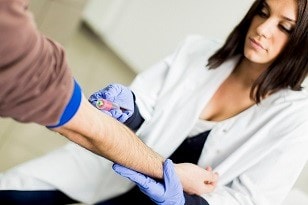Key points
- The only way to know whether you have high cholesterol is to get your cholesterol checked.
- The cholesterol test, or screening, requires a simple blood draw.
Cholesterol statistics
From 2017 to 2020, 86.4 million US adults age 20 or older had high or borderline high cholesterol (a total cholesterol level greater than or equal to 200 mg/dL).1
From 2009 to 2016, about 1 in 5 adolescents had an unhealthy cholesterol measurement.2
Because high cholesterol doesn't have symptoms, many people don't know their levels are high.
The only way to know whether you have high cholesterol is to get your cholesterol checked. Your health care team can do a simple blood test. This is called a "lipid profile."
Who should be tested
Talk with your health care team about your health history and how often you need to have your cholesterol checked. Cholesterol should be checked starting early in life—even children and adolescents should have their cholesterol checked.
- Most healthy adults should have their cholesterol checked every 4 to 6 years.
- People who have heart disease, diabetes, or a family history of high cholesterol need to get their cholesterol checked more often.
- Children and should have their cholesterol checked at least once between ages 9 and 11.
- Adolescents should have their cholesterol checked between ages 17 and 21.2
- Children who have obesity or diabetes may need to be screened for high cholesterol more often.
The 2018 American College of Cardiology/American Heart Association Guidelines recommend that cholesterol management be based on a person's lifetime cardiovascular risk, whether a person is 45 to 75 years of age, has diabetes, and has other factors. Many people have never had their cholesterol checked, so they don’t know whether they are at risk.2
Health care professionals calculate a person's lifetime cardiovascular risk by considering
- Any other health conditions the person may have at the same time (comorbidities).
- Whether the person is being treated for high blood pressure.
- Whether the person smokes.
- Any other factors that may increase cardiovascular risk.
Your cholesterol management and treatment decisions should be made in collaboration with a health care professional.

What happens during a cholesterol test?
The cholesterol test, or screening, requires a simple blood draw. The cholesterol test checks your levels of:
- Low-density lipoprotein (LDL) or "bad" cholesterol. Having high levels of LDL cholesterol can lead to plaque buildup in your arteries and result in heart disease or stroke.
- High-density lipoprotein (HDL) or "good" cholesterol. HDL is known as "good" cholesterol because high levels can lower your risk of heart disease and stroke.
- Triglycerides, a type of fat in your blood that your body uses for energy. The combination of high levels of triglycerides with low HDL cholesterol or high LDL cholesterol levels can increase your risk for heart attack and stroke.
- Total cholesterol, the total amount of cholesterol in your blood based on your HDL, LDL, and triglycerides numbers.
What do I need to know before getting a cholesterol test?
You may need to fast (not eat or drink) for 8 to 12 hours before your cholesterol test. Be sure to ask your doctor how to prepare for the test.
How do blood cholesterol numbers affect me?
Your cholesterol numbers are important, but they are just part of your overall health. Learn more about what optimal blood cholesterol numbers are.
Your health care team will look at your cholesterol numbers, along with your family history, age, sex, and other parts of your lifestyle or health, such as smoking, that could increase your risk for high cholesterol.
Additionally, your health care team may order a coronary artery calcium (CAC) scan to help understand your risk and determine the best way to manage your cholesterol levels.2
This complete picture helps your health care team determine whether you should take steps, such as lifestyle changes or cholesterol-lowering medicine, to lower your risk for heart disease and stroke.
Resources
CDC
Other organizations
- MedlinePlus: Cholesterol
- NHLBI: High Blood Cholesterol—What You Need to Know
- Tsao CW, Aday AW, Almarzooq ZI, Beaton AZ, Bittencourt MS, Boehme AK, et al. Heart Disease and Stroke Statistics—2023 Update: A Report From the American Heart Association. Circulation. 2023;147:e93–e621.
- Perak AM, Ning H, Kit BK, et al. Trends in Levels of Lipids and Apolipoprotein B in US Youths Aged 6 to 19 Years, 1999-2016. JAMA. 2019;321(19):1895-1905.
- Grundy SM, Stone NJ, Bailey AL, Beam C, Birtcher KK, Blumenthal RS, et al. 2018 ACC/AHA/AACVPR/AAPA/ ABC/ACPM/ADA/AGS/APhA/ASPC/NLA/PCNA guideline on the management of blood cholesterol: a report of the American College of Cardiology Foundation/American Heart Association Task Force on Clinical Practice Guidelines. Circulation. 2018;0:CIR.0000000000000625.
